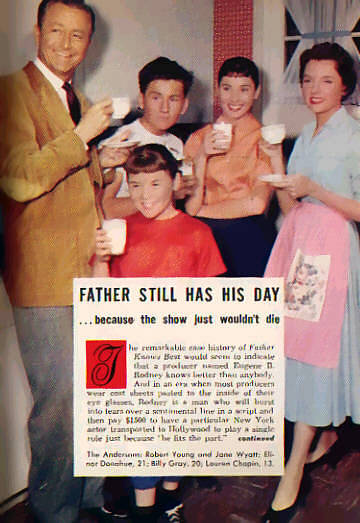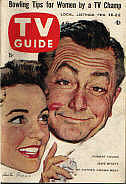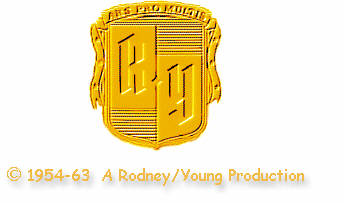TV Guide 1958
Father Still Has His Day
. . . because the show just wouldn’t die
Movie actor Robert Young created the role of Jim Anderson and has been doing it ever since. When he and his partner, Gene Rodney, decided to try it on for size as a TV show, Rodney plunked for Jane Wyatt as Margaret Anderson and wouldn’t budge until she accepted. Says Miss Wyatt, “Gene is like that. He simply won’t compromise. He knows everything there is to know about this show. After my first season, I went to him and asked how I could improve my characterization. He looked at the ceiling for a moment and said, “Love your children as much as you love your husband.’ He was right. I’d been concentrating on building up a firm, strong relationship between Jim and Margaret and had been neglecting the children.”
The show’s children, played by 21-year-old Elinor Donahue, 20-year-old Billy Gray (Whose height, 5 feet, 5 ½ inches, keeps him believable as 15 ½-year-old Bud) and 13-year-old Lauren Chapin, cost Rodney and Screen Gems more than 100 interviews before the right three were chosen.
When FKB took to the CBS air in October 1954, it was greeted with what might be called polite enthusiasm. It was something of an odd ball among the stereotyped family situation-comedy shows, for Father was not depicted as a full-fledged chicken head given to putting his foot into paint buckets.
The Andersons were, in fact, a pleasantly intelligent and happy American family with all the built-in values of a crashing bore so far as entertainment was concerned. At the end of the first 26 weeks on the air, in fact, the sponsor decided this was indeed the case and declined to pick up the option.
What happened after that is still one of the very few case histories of a show literally being brought back by what press agents like to call “Popular Demand.” The action started with a handful of letters from irate viewers and a number of surprisingly vehement articles by some of the top columnists around the country.
FKB was back on the air, via NBC, by August of 1955, and has since won three Emmys and so many other awards and citations that no one has yet bothered to add them all up.
“Actually,” says Miss Wyatt, an attractively cheerful actress who is well remembered for her role opposite the late Ronald Colman in “Lost Horizon,” “this show has grown up a good deal in four years. What Bob has taught those three youngsters about acting could make a book in itself. He’s a perfectionist, you know, and he insists on perfection from everybody.
“I think his secret lies in treating the kids as adult actors rather than as children. They don’t get any discipline or scolding on the set. In fact, It’s so completely lacking that when I get back to my own home I find myself letting off steam and crackling at my own two children.” (Married 21 years to broker Edgar Ward, Miss Wyatt has two sons aged 20 and 14, and sometimes gets crackled right back at.)
FKB‘s biggest accomplishment, however, has been impressing itself upon the collective civic conscience of the American Organization. “We’re an entertainment show,” producer Rodney insists, “and have never had any intention of preaching. But when you’re doing a family show and the family is an intelligent one, you just naturally come up with problems and solutions.”
The problems and their solutions have resulted in requests from all over the country for everything from copies of scripts to personal appearances by young, the usual bait being another award. In this past season alone the show has received legitimate requests from 22 outstanding organizations, ranging from a New York life insurance company (which requested, and got, insurance man Jim Anderson to preside at the opening of its West Coast headquarters) to the U.S. Army Recruiting Service (which requested, and got, young and Miss Wyatt to ride the Army float in the 1958 Tournament of Roses parade in Pasadena).
This week, for Father’s Day, the Mount Sinai Hospital and Clinic, is saluting Young as Father of the Year, a title twice bestowed upon him by the National Father’s Day Committee.
The National Safety Council has virtually adopted Young as its patron saint and he looks upon it as an all-year job, attending Safety Council conventions, making radio recordings, doing TV announcements.
A Wednesday night staple for the past four seasons, FKB in September switches to Mondays at 8:30 P.M. (EDT) and also moves back to its original network, CBS. Meanwhile, it continues to be seen in a total of 21 foreign countries, ranging from Germany to Australia, where, according to Screen Gems, it is “very large.” Its American audience is estimated at some 25,000,000 viewers each week.
All this gets Bob young no place in the bosom of his own family, which consists of his wife and five daughters. When he recently said, “I don’t know” as a perfectly fatherly and logical answer to a question asked by one of his daughters, she bridled a bit and said, “But Jim Anderson always knows.” “Jim Anderson,” Young replied, not without a trace of quiet bitterness, “has two writers. Bob Young doesn’t have any.”
Written by Dan Jenkins



